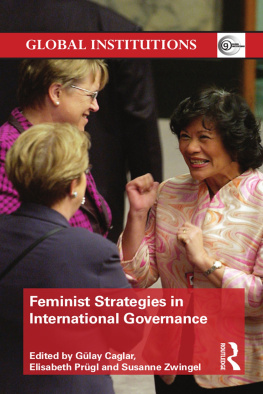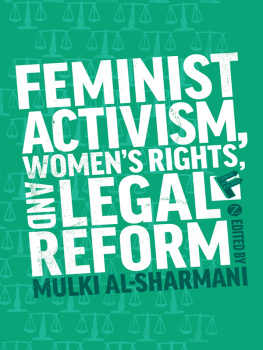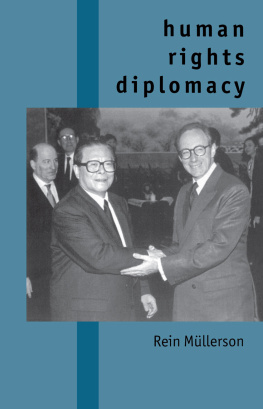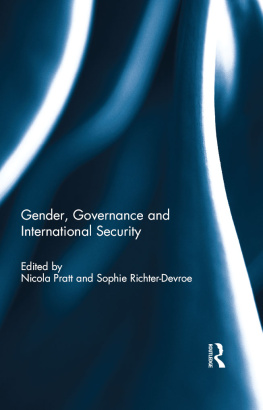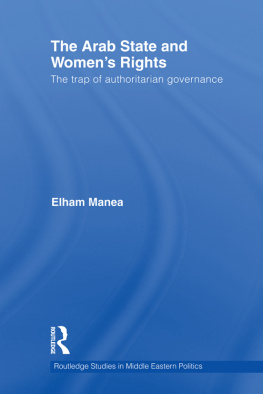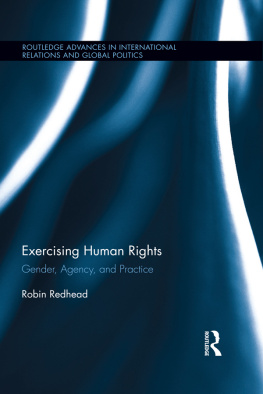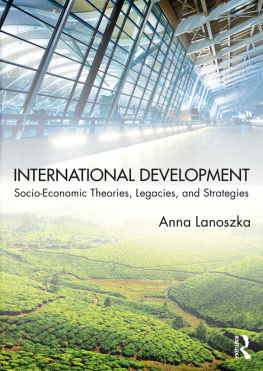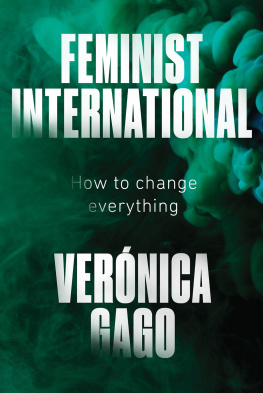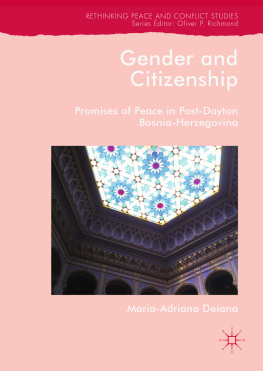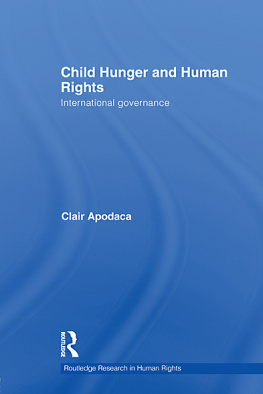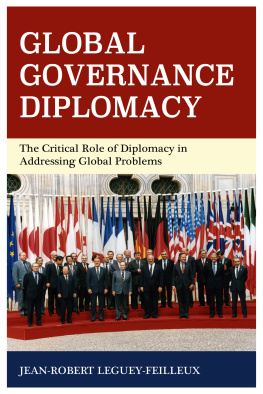Feminist Strategies in
International Governance
The struggle for women's rights and to overcome gender oppression has long engaged the efforts of intergovernmental and nongovernmental organizations. Feminist Strategies in International Governance provides a new introduction to the contemporary forms of this struggle. It brings together the voices of academics and practitioners to reflect in particular on the effectiveness of human rights strategies and gender mainstreaming. It covers three international issue areas in which feminists currently seek change: women's human rights and violence against women; the participation of women in peace-making and their protection during conflict; and the gendered effects of development, economic and financial governance.
The book combines a critical reflection on the current state of feminist politics with an introduction to urgent issues on the contemporary international agenda. In addition, the book draws on innovative conceptualizations from constructivism in international relations, legal anthropology and discourse theory to provide new framings of current feminist struggles.
Offering an accessible guide to the engendering of international governance and examining the challenges for international feminist politics in the future, this work will be of great interest to students and scholars of international organizations, gender politics and global governance.
Glay Caglar is a research fellow in the Division of Gender and Globalization at the Humboldt-University of Berlin, Germany. Her research focuses on gender politics in global economic governance.
Elisabeth Prgl is Professor of International Relations at the Graduate Institute of International and Development Studies in Geneva. Her research focuses on gender politics and international organizations.
Susanne Zwingel is Associate Professor of Politics at the State University of New York in Potsdam, NY. Her research focuses on human rights and gender in global governance.
Routledge Global Institutions Series
Edited by Thomas G. Weiss
The CUNY Graduate Center, New York, USA
and Rorden Wilkinson
University of Manchester, UK
About the series
The Global Institutions Series has two streams. Those with blue covers offer comprehensive, accessible, and informative guides to the history, structure, and activities of key international organizations, and introductions to topics of key importance in contemporary global governance. Recognized experts use a similar structure to address the general purpose and rationale for specific organizations along with historical developments, membership, structure, decision-making procedures, key functions, and an annotated bibliography and guide to electronic sources. Those with red covers consist of research monographs and edited collections that advance knowledge about one aspect of global governance; they reflect a wide variety of intellectual orientations, theoretical persuasions, and methodological approaches. Together the two streams provide a coherent and complementary portrait of the problems, prospects, and possibilities confronting global institutions today.
The most recent related titles in the series include:
The Organization of American States (2011)
by Monica Herz
African Economic Institutions (2010)
by Kwame Akonor
Institutions of the Global South (2009)
by Jacqueline Anne Braveboy-Wagner
Institutions of the Asia-Pacific (2009)
by Mark Beeson
The African Union (2008)
by Samuel M. Makinda and F. Wafula Okumu
The European Union (2008)
by Clive Archer
First published 2013
by Routledge
2 Park Square, Milton Park, Abingdon, Oxon OX14 4RN
Simultaneously published in the USA and Canada
by Routledge
711 Third Avenue, New York, NY 10017
Routledge is an imprint of the Taylor & Francis Group, an informa business
2013 Editorial and selected matter; Glay Caglar, Elisabeth Prgl and Susanne Zwingel, contributors their contributions
The right of Glay Caglar, Elisabeth Prgl and Susanne Zwingel to be identified as editors of this work has been asserted by them in accordance with the Copyright, Designs and Patent Act 1988.
All rights reserved. No part of this book may be reprinted or reproduced or utilised in any form or by any electronic, mechanical, or other means, now known or hereafter invented, including photocopying and recording, or in any information storage or retrieval system, without permission in writing from the publishers.
Trademark notice: Product or corporate names may be trademarks or registered trademarks, and are used only for identification and explanation without intent to infringe.
British Library Cataloguing in Publication Data
A catalogue record for this book is available from the British Library
Library of Congress Cataloging in Publication Data
Feminist strategies in international governance / edited by Glay Caglar,
Elisabeth Prgl & Susanne Zwingel.
p. cm. (Routledge global institutions series; 70)
Includes bibliographical references and index.
1. International cooperation. 2. Women's rightsInternational cooperation. 3. FeminismInternational cooperation. 4. WomenPolitical activity. 5. Women and peace. I. Caglar, Glay. II. Prgl, Elisabeth. III. Zwingel, Susanne, 1968
JZ1253.2.F48 2012
323.34dc23
2012011990
ISBN: 978-0-415-50905-3 (hbk)
ISBN: 978-0-203-09496-9 (ebk)
Typeset in Times New Roman
by Taylor & Francis Books
Contents
Tables
Contributors
Rosa Alayza is a Sociologist, who has studied at the master and doctoral levels in Political Science. She currently teaches in the undergraduate and master programs in Political Science and Government at the Pontfica Universidad Catlica in Lima (Peru). Her areas of interest are the links between state and society, public space under weak democracy and globalization conditions.
Kate Bedford is a Senior Lecturer in Law at the University of Kent. She holds a PhD in Political Science from Rutgers. Her research focuses on the interactions between sexuality studies, development studies, and international political economy. Her publications include Developing Partnerships: Gender, Sexuality, and the Reformed World Bank (University of Minnesota Press, 2010). She is currently researching the feminist political economy of gambling liberalization, with a particular focus on bingo.
Glay Caglar is a Research Fellow in the Division of Gender and Globalization at the Humboldt-University of Berlin, Germany. She received her doctoral-level degree in Political Science at the University of Kassel. Her research focuses on modes of knowledge production and gender politics in global economic governance. She has published a book and several articles in this area, including Multiple Meanings of Gender Budgeting: Gender Knowledge and Economic in the World Bank and UNDP in the book Gender Knowledge and Knowledge Networks in International Political Economy (Nomos, 2010) edited by Brigitte Young and Christoph Scherrer.
Hilary Charlesworth is an Australian Research Council Laureate Fellow and Director of the Centre for International Governance and Justice at the Australian National University. Her research interests are in international law and international human rights law, particularly the application of feminist theories in these areas.
Carolyn Hannan is currently Associate Professor in the Human Geography Department, University of Lund, in Sweden. She worked in the United Nations Secretariat in New York for 10 years, as the Principal Officer for Gender Mainstreaming (19992001) and as the Director of Division for the Advancement of Women (20019). Prior to joining the United Nations, she worked with the Swedish International Development Cooperation Agency (SIDA) for 15 years, including both in the field and as the Senior Policy Advisor on Gender Equality in Stockholm in the 1990s. During this period, she was also part of a Swedish advisory expert group on gender mainstreaming attached to the Swedish Ministry for Gender Equality. From 1995 to 1997 she was the Chairperson of the OECD/DAC Gender Equality Network.

